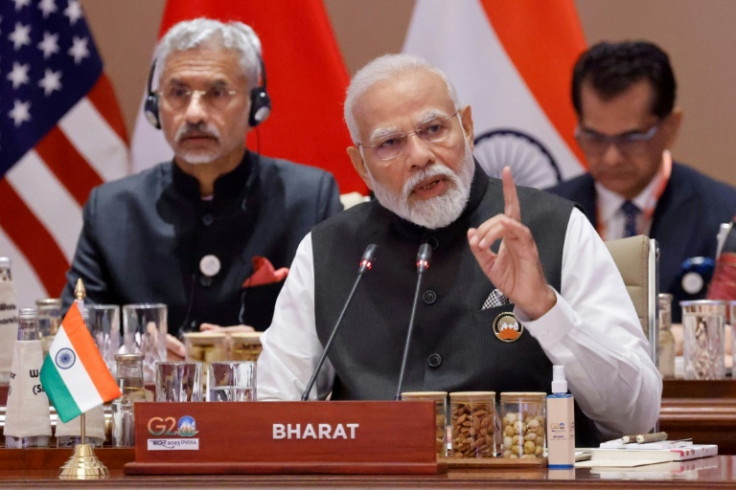G20 Key Takeaways: Modi And India Win Big; Ukraine Loses Out

KEY POINTS
- Germany's Scholz said the G20 Declaration was proof of the 'success of Indian diplomacy'
- The G20 declaration presented a 'softer' stance on Russia's invasion of Ukraine
- Leaders committed to strengthening the 'voice of developing countries' in global decision-making
The G20 Summit in New Delhi ended over the weekend with western leaders and diplomats showering lavish praise on Indian Prime Minister Narendra Modi's leadership for forging consensus when it seemed deep divisions threatened to undermine the grouping – but the bigger story was how India had managed to direct the group's focus to issues dear to the ascending Global South. The West also had to soften its stance on the war in Ukraine, an issue on which it had failed to get support from the developing world for more than a year.
The theme of this year's G20 summit, held on Sept. 9-10 in New Delhi, was "Vasudhaiva Kutumbakam," translated as "One Earth, One Family, One Future." India said the theme and the 2023 logo, which was inspired by India's national flag, represented "a uniquely Indian approach" that centers on "living in harmony with the surrounding ecosystem."
Modi heralds new era as a global statesman
Many observers hailed Indian Prime Minister Narendra Modi's bid to cement his country's position as the Global South's "voice" and a "bridge" to the West during the G20 summit as a success.
Early doubts about India's ability to shepherd G20 members toward a consensus were dispelled quickly after the countries concluded the conference with a unanimous declaration on the group's biggest divisive subject: the war in Ukraine.
During bilateral talks between Modi and German Chancellor Olaf Scholz, the latter congratulated the Indian PM for successfully carrying out India's G20 presidency. He said the unanimous consensus showed the "success of Indian diplomacy."
African Union welcomed as a permanent member
The summit marked the second time a regional organization was included as a permanent member of the group, the first being the European Union.
Consensus reached on Ukraine war despite differences
The G20 members condemned the war in Ukraine but without naming Russia.
The G20 Leaders' Summit Declaration noted that "all states must refrain from the threat or use of force to seek territorial acquisition against the territorial integrity and sovereignty or political independence of any state."
The G20's declaration in Bali last year strongly condemned Russia's invasion of Ukraine. The statement released after the summit in Indonesia read, "Many members agreed that the recovery of the global economy has slowed and is facing a major setback as a result of Russia's war in Ukraine."
Many observers say the consensus reached at the summit underlines the willingness of Western nations to "salvage the credibility" of the G20 that was put to the test after the Russian invasion of Ukraine, considering how India and the Global South are considered some of the world's most powerful developing economies.
Ukraine slammed the joint declaration, saying there was "nothing to be proud of" regarding the wording of the agreement. Ukraine's foreign ministry spokesperson Oleg Nikolenko posted a screenshot of the declaration by replacing "in" with "against" and "all states" with "Russia."
G20 adopted a final declaration. We are grateful to the partners who tried to include strong wording in the text. However, in terms of Russia's aggression against Ukraine, G20 has nothing to be proud of. This is how the main elements of the text could look to be closer to reality pic.twitter.com/qZqYluVKKS
— Oleg Nikolenko (@OlegNikolenko_) September 9, 2023
Global South takes the spotlight
While the Ukraine consensus was a major breakthrough, another key takeaway was India managing to put the Global South in the spotlight.
The Global South is a broad term that has been used traditionally to refer to developing countries. Happymon Jacob, founder of New Delhi-based Council for Strategic and Defense Research, says the Global South "is a geographical, geopolitical, historical and development concept, all at the same time – with exceptions."
At the Voice of Global South Summit in January, India hosted 125 countries, with China being a notable absentee. At the event, Modi "highlighted the opportunity" to prop up societies and economies in the Global South through a shared vision and agenda, according to a news release from India's Ministry of External Affairs.
The G20 declaration made more than 30 references toward helping boost developing countries, including in debt resolution, food security, trade inclusion, accessible financing, healthcare inclusivity, affordable sustainable energy transition and promoting inclusion for global decision-making. The leaders affirmed their commitment to "better integrate perspectives of developing countries ... into future G20 agenda and strengthen the voice of developing countries in decision making."
India takes on the China challenge
Chinese President Xi Jinping skipped the summit, with Premier Li Qiang leading the country's delegation. Political analysts dubbed it as an attempt to overshadow India's potential to unify the bloc and become a bridge between the Global South and the West.
The compromise the U.S. and its allies made to soften the language on the Ukraine war is seen as a small price to pay, given that Washington wants to present India as a rising dark horse with the power to counter China's rising global influence.
© Copyright IBTimes 2024. All rights reserved.






















